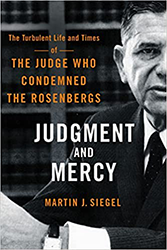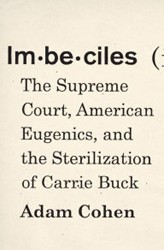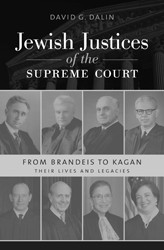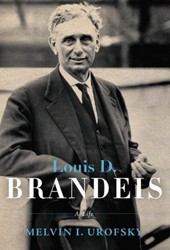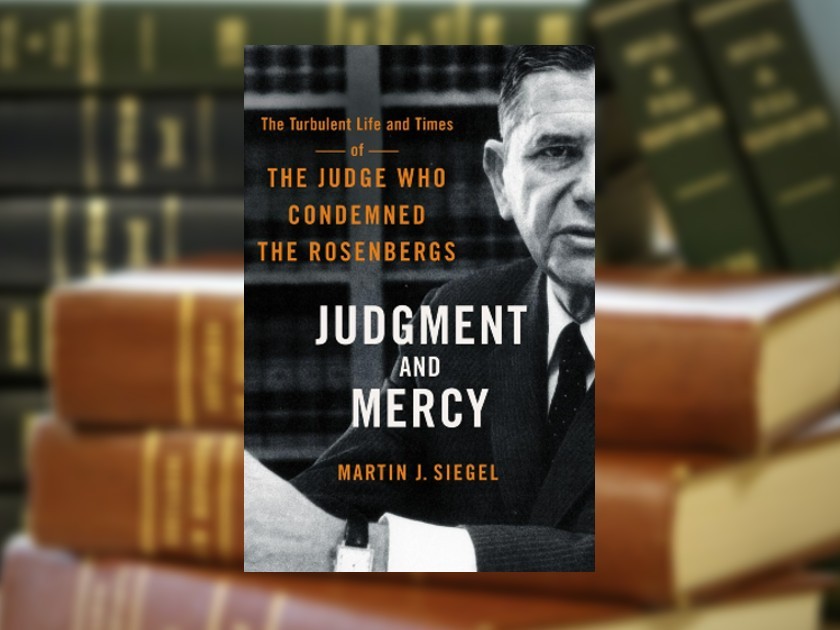
In 1949, thirty-nine-year-old Irving Robert Kaufman became the second-youngest federal judge in America. The son of poor Galitzianers, he rose to fame as a “boy prosecutor,” successful private lawyer, and Democratic Party politico. After learning of President Truman’s appointment, Kaufman drafted remarks recalling his meager beginnings: “My mind goes back to my early youth, the son of immigrants, and I promise … I shall endeavor … to make it a lot easier for those who are now struggling like I did 20 years ago.”
Before he could make good on that fundamentally liberal pledge, however, a tangle of motives led him into a decision often called one of the most reactionary in American law: he condemned Julius and Ethel Rosenberg to die in the electric chair.
Federal authorities prosecuted the couple in March 1951 for handing “the secret” of the atomic bomb to Joseph Stalin. Keenly aware of the case’s potential as a tool for promotion, Kaufman badly wanted the assignment and used backchannel connections to get it. After the jury convicted the Rosenbergs, he gave a nearly hysterical speech denouncing them for a “diabolical conspiracy to destroy a God-fearing nation” and blaming them for nothing less than triggering the Korean War.
Finding any judge willing to show mercy for Soviet spies just then would have been challenging, but few were as hardwired to loathe the Rosenbergs as Kaufman. He was a protégé of J. Edgar Hoover and shared his patron’s harsh anticommunism. More deeply, he vilified these two people who’d once been just like him — poor Jews on the Lower East Side, second-generation Americans born to immigrant parents — but then spurned everything he stood for.
While Kaufman had grasped the lifeline extended however grudgingly to Jews and other newcomers, the Rosenbergs saw Kaufman’s path as a cruel mirage. Unlike many Jews, they hadn’t yet made it much beyond ghetto-like privation. To them, the American dream was a cover for class exploitation and violent racism. In their letters to each other from the Sing Sing “Death House,” they scorned Kaufman as an “errand boy” for the capitalist bosses and part of America’s Judenrat—the German word for the Jewish councils the Nazis formed to facilitate genocide, and Julius’s preferred term for the Jewish establishment.
The chasm between their worldviews was all-encompassing. When Kaufman charged the Rosenbergs with a diabolical plot to destroy America, it was his America he was talking about: the promised land that Jews like him had sought for millennia and finally found. “The defendants were born in America, reared in America and educated in the public schools of America,” he wrote in an opinion in 1953, reaffirming the death sentences. “They had lived their entire lives among us; they had all the advantages of our free institutions and had enjoyed the privileges of American citizenship.… [Yet] they chose the path of traitors and decided to abandon those who had nurtured and fed them in favor of a nation whose ideology was repugnant to everything we have learned, lived for and to which we have been dedicated.” As his wife wrote him in a personal note around the same time, “Don’t let the commies get you down. Keep remembering — they are trying to undermine the safety of our country. Where could we go from here?” Nowhere, Kaufman knew.
Yet as a route to the top spot in Kaufman’s universe — the “Jewish seat” on the US Supreme Court, then held by Felix Frankfurter — the Rosenberg case failed to deliver.
The sentences were widely popular when first imposed, but opposition slowly grew over the next two years, often from other Jews. “Is this the Dreyfus case of Cold War America?” one article asked. A rabbi in Chicago charged Kaufman with “leaning over backward in his desire to show that Jews condemn treason.” The California Jewish Voice “despis[ed] the cowardly Jewish judge” for emulating fascist and communist justice with such draconian punishment. Critics also noted that no Jews had served on the jury. In Brooklyn’s Jewish Examiner, another rabbi wrote that Kaufman’s well-publicized visit to a synagogue to meditate on the sentences had been “a pretty gesture. But he should have gone to the Talmud [where he] would have found that Jewish tradition has always been unalterably opposed to the death penalty.”
The case, which had long before become a sort of poisoned chalice, haunted him quite literally to the grave.
The unexpected criticism stung. In a meeting with a columnist and an official from the Anti-Defamation League in his Park Avenue apartment, Kaufman admitted feeling “terrific pressure in the Rosenberg case from Jewish sources. Several rabbis have been to see him. Members of his own synagogue are putting pressure on him. He is standing alone.” He asked them, the FBI, and friendly journalists to press his case in public, and they did. Although the movement in support of clemency for the doomed couple grew here and around the world, and eventually united figures as disparate as Picasso and the Pope, most Americans and Jews continued to support the executions up to and after they were carried out amid riots and international tension in June 1953.
Afterward, as temperatures cooled, Jews made covert efforts to either reward or punish Kaufman. Those who wanted to promote him to the next level in the judiciary, the Court of Appeals, saw him as good for the Jews. Julius Klein, head of a Jewish American veterans’ group, wrote US Senator Jacob Javits — also a Kaufman supporter — to say that “because of what Kaufman did in the Rosenberg case, we American Jews can walk erect on Main Streets in America.… My only interest in Kaufman is a patriotic one. It means nothing to me … but it means a lot to our people.
Frankfurter, on the other hand, vowed to block Kaufman’s ascent to the Supreme Court, writing to his friend, the famous judge Learned Hand: “I despise a judge who feels God told him to impose a death sentence.… I am mean enough to try to stay here long enough so that [Kaufman] will be too old to succeed me!!”
Kaufman eventually won promotion to the Court of Appeals, but he never reached the Supreme Court. In thirty years on the appellate bench, however, he worked hard to relegate the Rosenberg case and its ugly ending to the past. His decisions liberalized the insanity defense, reformed Attica-era prisons, advocated constitutional protection for poor people, spared John Lennon from politically motivated deportation, greatly expanded free speech, brought foreign human rights abusers to justice in US courts, and more. Broadly speaking, he kept his 1949 promise to make it easier for people struggling as he once had.
But he could never outrun the Rosenbergs. New revelations in the 1970s showed he’d held improper, secret consultations with prosecutors, including the infamous Roy Cohn, during the trial. In the era of détente, death sentences imposed during the throes of McCarthyism seemed like a primitive and fanatical overreaction. Kaufman was dogged by courthouse protests, denunciations in print, and calls for impeachment.
He tried to hit back with op-eds penned by friends and support from the organized bar. In the New York Times, he complained plaintively of “a continuing pattern of harassment because of a trial I presided over more than 20 years ago” — of “old issues” wrongfully obscuring his more recent liberalism. Worse still, his immediate family suffered from mental illness, substance abuse, and suicide attempts due in part, some relatives believed, to the never-ending pressure cooker of the Rosenberg ordeal.
His death at eighty-one should finally have brought release. As one of his last two law clerks, I sat in the same synagogue he claimed to have visited while the rabbi eulogized him. Just then, someone behind me stood up and bellowed, “He murdered the Rosenbergs! Let him rot in hell!” The case, which had long before become a sort of poisoned chalice, haunted him quite literally to the grave.
Read more on Martin J. Siegel’s Judgment and Mercy: The Turbulent Life and Times of the Judge Who Condemned the Rosenberg.
Martin J. Siegel clerked for Judge Kaufman after graduating from Harvard Law School. He then served as an Assistant U.S. Attorney in New York and a staffer on the U.S. Senate Judiciary Committee. He now practices and teaches law in Houston, Texas. Siegel’s writing has appeared in The New York Times, Los Angeles Times, Houston Chronicle, and legal journals.
